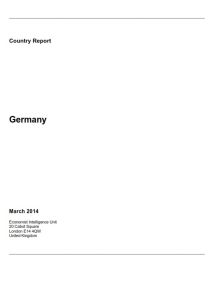Melden Sie sich bei getAbstract an, um die Zusammenfassung zu erhalten.

Melden Sie sich bei getAbstract an, um die Zusammenfassung zu erhalten.
The Economist Intelligence Unit
Germany
Country Report; March 2014
EIU, 2014
Was ist drin?
A glance at the future of the German economy reveals both good and bad potential outcomes.
Recommendation
The Economist Intelligence Unit forecasts mostly steady growth and stability in Germany’s 2014-2018 economy. Increasing exports, low inflation, a rising GDP and small budget surpluses should prevail. Yet uncertainties about potential euro-zone financial obligations and the actions of the prowling Russian bear cast a shadow on this prediction of prosperity. getAbstract recommends this succinct report’s straightforward tables and charts to observers of – and participants within – the German and euro-zone economies.
Summary
About the Author
The Economist Intelligence Unit is an independent research and analysis organization.
























































































































Comment on this summary